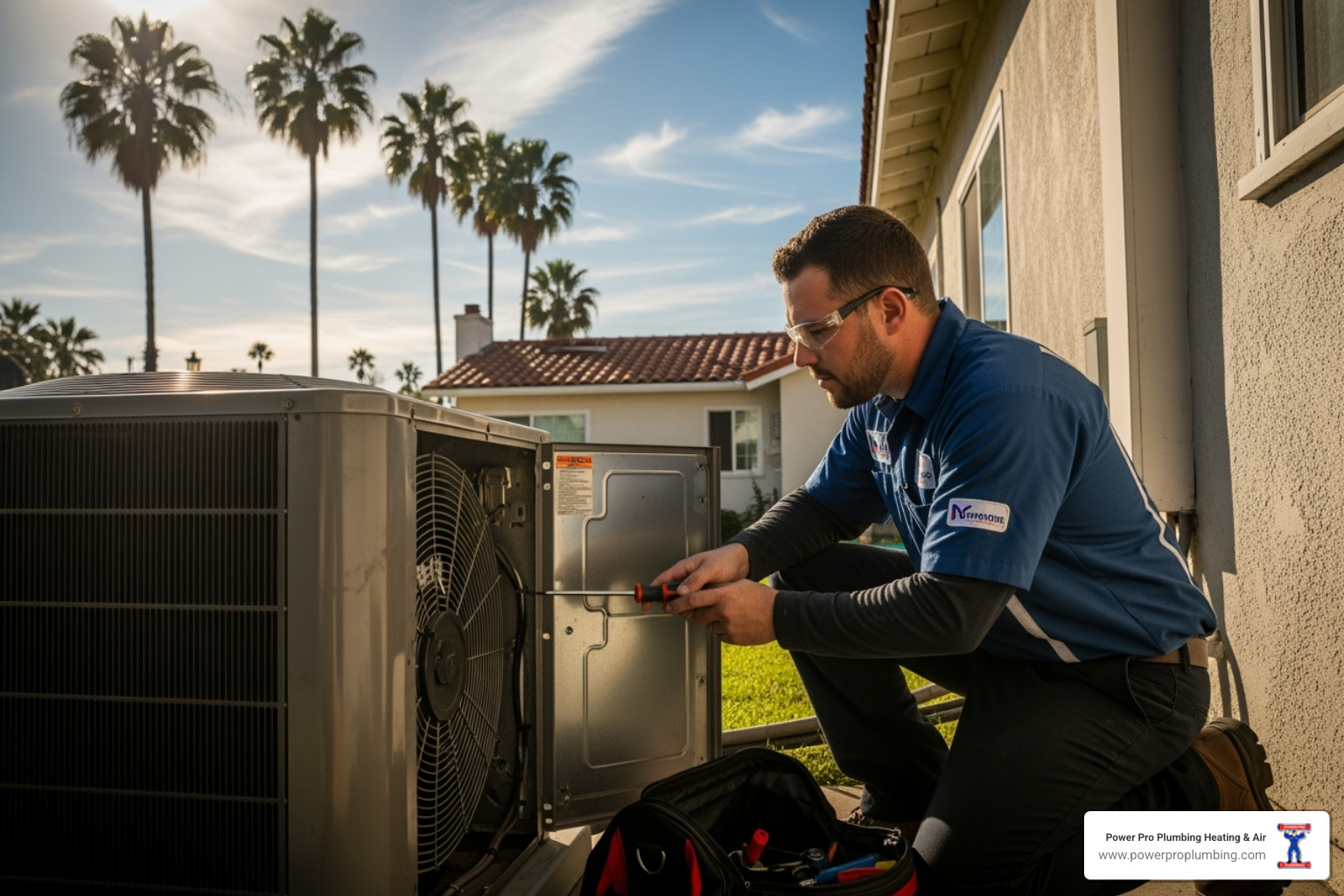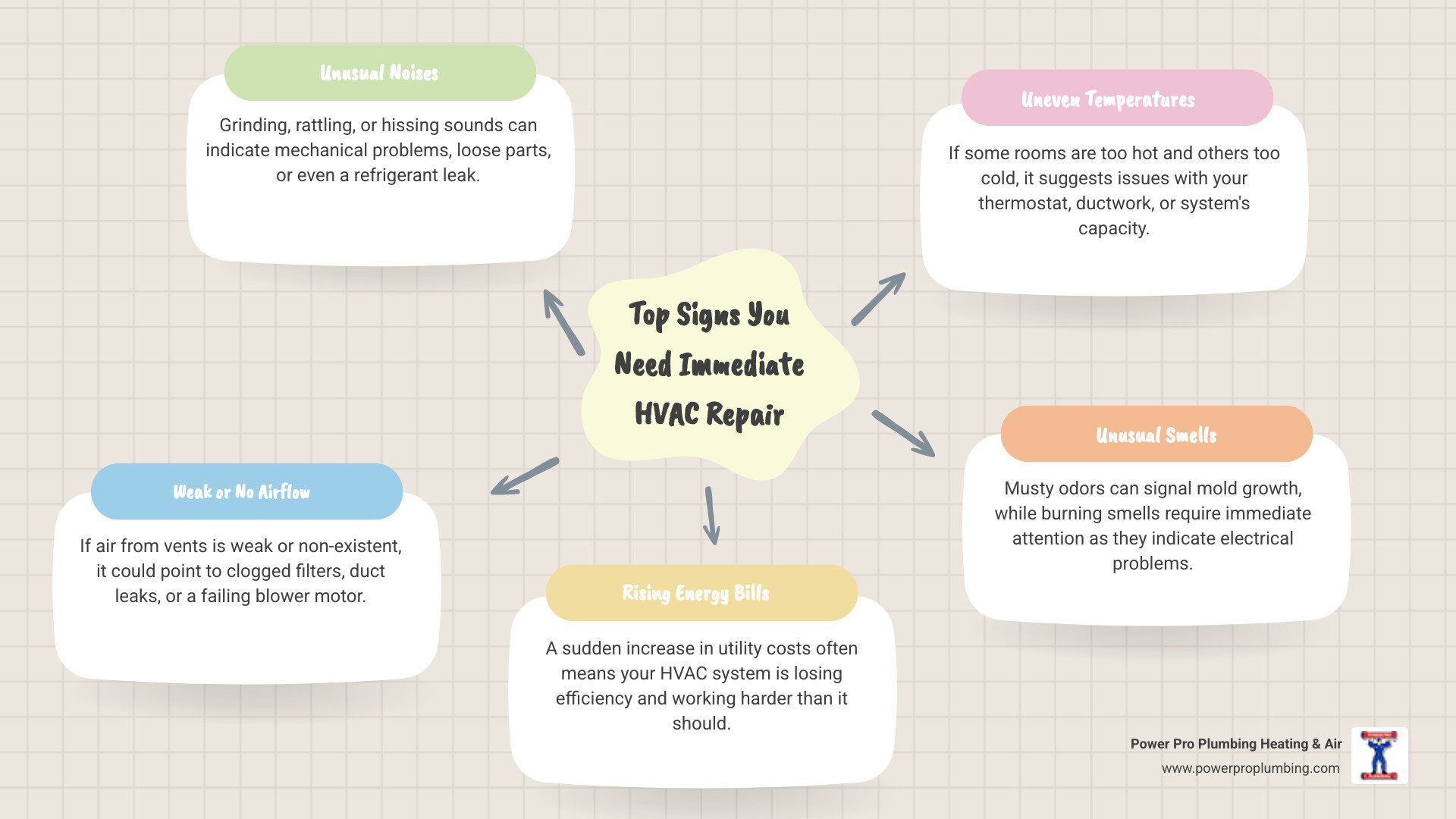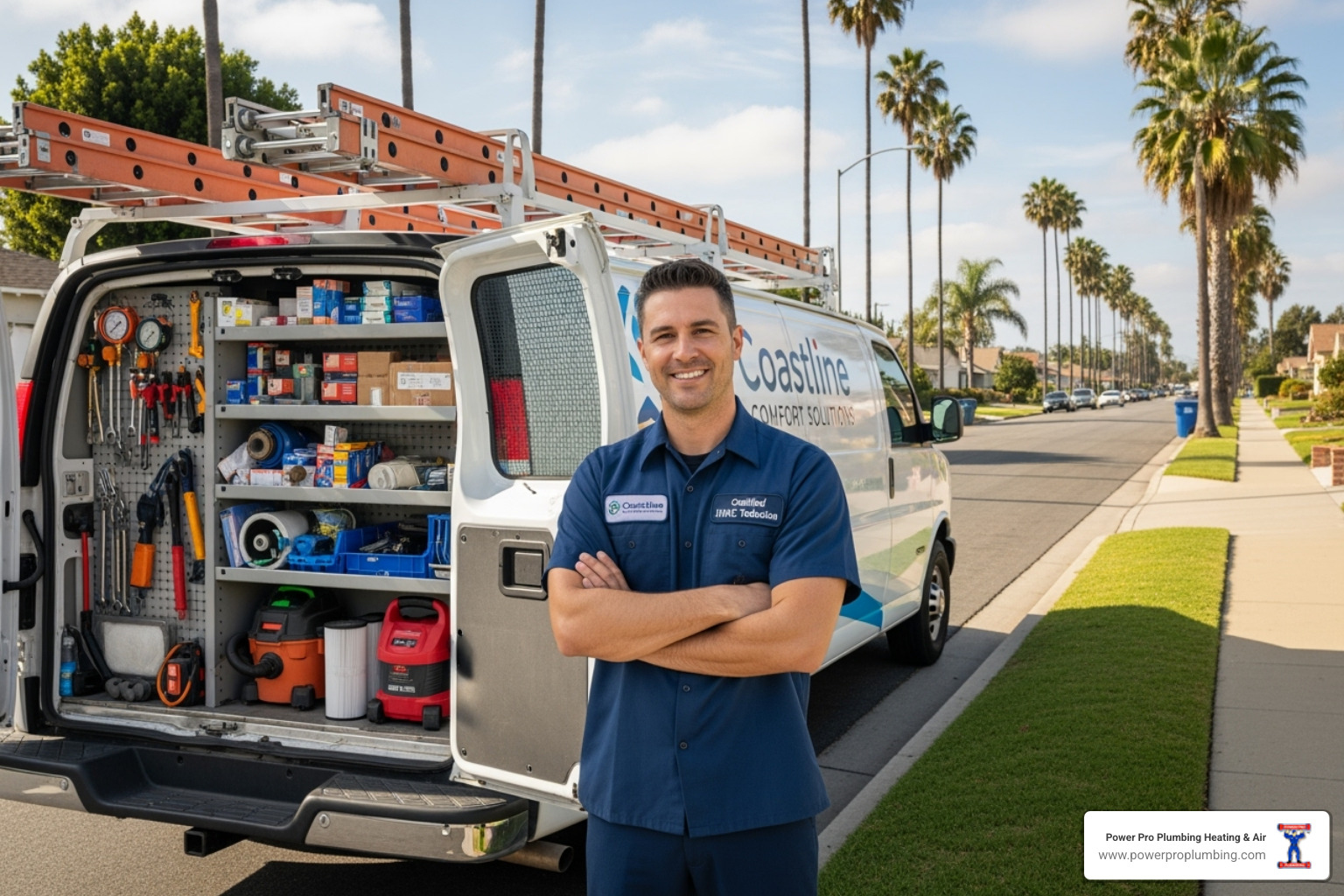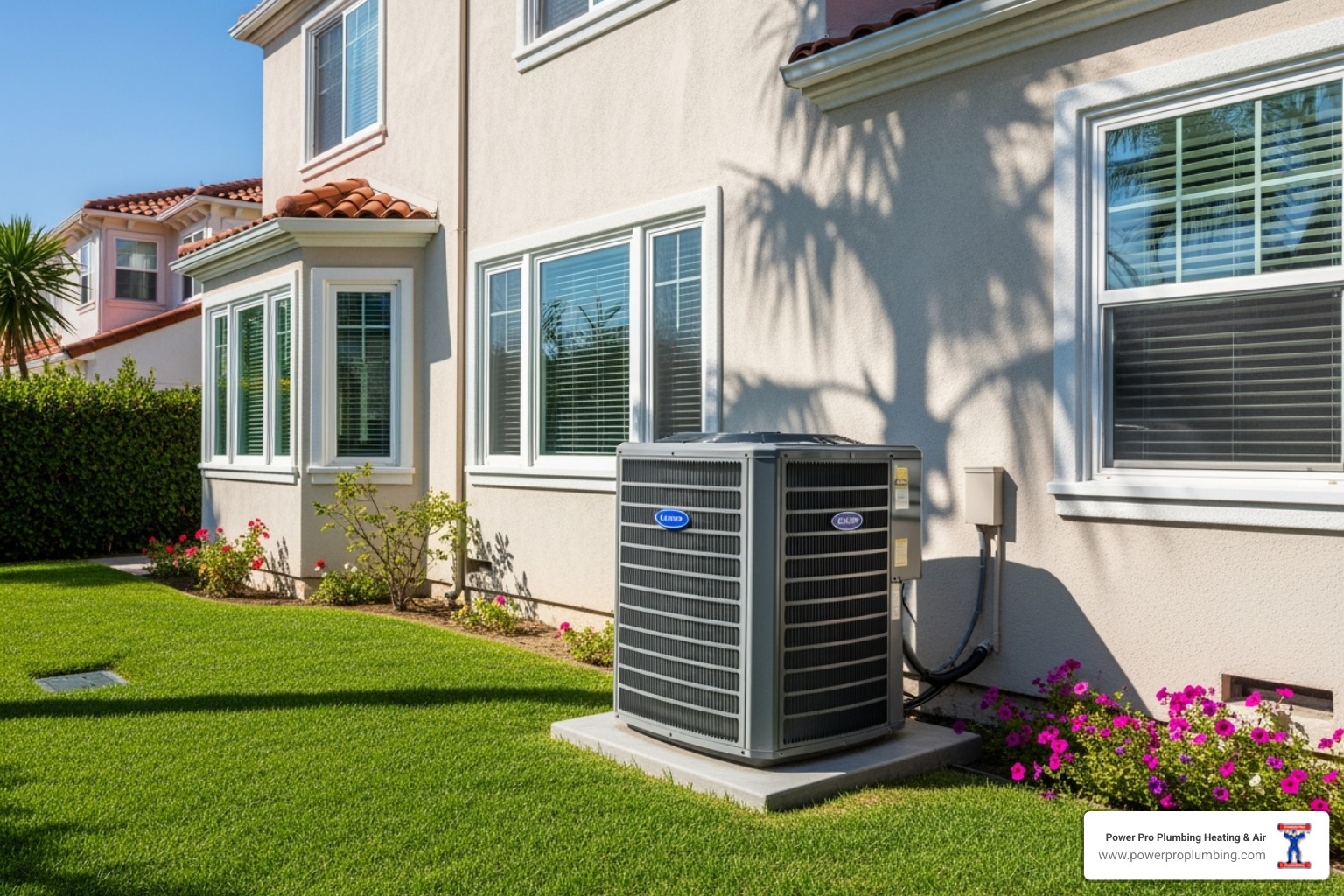
Why Long Beach Homeowners Can't Ignore HVAC Problems
When your HVAC repair Long Beach needs strike, you need answers fast. Here's what you need to know:
Top Signs You Need Immediate HVAC Repair:
- Strange noises from your system
- Weak or no airflow
- Rising energy bills
- Uneven temperatures throughout your home
- Unusual smells or burning odors
- System short cycling (turning on/off frequently)
- Thermostat not responding
Living in Long Beach means your HVAC system works year-round. While our coastal climate is mild compared to inland areas, the constant ocean breeze brings salt air that corrodes equipment faster. High humidity can clog filters and create mold issues. Your system rarely gets a break.
The reality? Most Long Beach residents don't realize their HVAC unit needs attention until it completely fails. As one local homeowner shared: "I noticed my AC making weird noises for weeks, but I kept putting off calling someone. Then it died completely during a heat wave."
Don't wait for a complete breakdown. Small problems become expensive emergencies when ignored. A refrigerant leak that costs $200 to fix today could mean a $5,000 system replacement tomorrow.
The good news? Recognizing warning signs early saves you money and keeps your family comfortable. Experienced local HVAC companies have served the community for decades, proving that professional help is always available when you need it.

Recognizing the Signs: When to Call for HVAC Repair in Long Beach
Your home's heating, ventilation, and air conditioning (HVAC) system is crucial for comfort, especially in Long Beach's unique climate. But how do you know when it's time to call for professional HVAC repair Long Beach services? We've identified the most common issues that homeowners face and the tell-tale signs that indicate a need for immediate attention.
One of the most obvious signs is weak or no airflow coming from your vents. If you notice that your system is running but not much air is circulating, or if the air isn't as cool or warm as it should be, it could point to a number of problems, from a clogged air filter to issues with the blower motor or ductwork.
Strange noises are another clear indicator. While some operational sounds are normal, loud bangs, squealing, grinding, hissing, or rattling sounds are not. These often signal mechanical problems, such as a failing motor, loose parts, or issues with the fan blades. For instance, a loud noise might indicate a broken fan, while hissing could point to a refrigerant leak.
Have you noticed unusual smells emanating from your vents? A burning odor could mean electrical issues or a dirty filter, while a musty smell often indicates mold or mildew growth within the system or ductwork, a common concern in our humid coastal environment.
A sudden and unexplained rise in your energy bills is a red flag. If your HVAC system is working harder than it should to maintain the desired temperature, it's likely losing efficiency. This could be due to a lack of maintenance, a refrigerant leak, or a failing component.
Thermostat issues can also mislead you. If your thermostat isn't responding to changes, or if the temperature displayed doesn't match the actual temperature in your home, it might be faulty, or it could be a symptom of a larger problem with the HVAC unit itself.
Finally, short cycling, where your system turns on and off frequently without completing a full heating or cooling cycle, is a sign of trouble. This can be caused by an oversized unit, a clogged air filter, or even a refrigerant leak, and it puts immense strain on your system, leading to premature wear and tear. Uneven temperatures around your property, with some rooms being too hot and others too cold, also suggest a system struggling to distribute conditioned air properly. And don't ignore moisture or leaks around your indoor or outdoor units, which could indicate a clogged drain line, a refrigerant leak, or other serious issues.
Common HVAC Problems in Coastal Homes
Long Beach's proximity to the ocean creates specific challenges for HVAC systems. We understand these unique conditions and how they impact your equipment.
One significant factor is salt air corrosion. The salty air can accelerate the deterioration of outdoor units, leading to rust and corrosion on metal components. This can compromise the structural integrity of your unit and lead to costly repairs if not addressed. Regular cleaning and protective coatings can help mitigate this.
High humidity is another prevalent issue. Our coastal climate contributes to higher indoor humidity levels, which can make your AC system work harder to cool your home. More importantly, high humidity can foster mold growth concerns within your HVAC system and ductwork. Mold not only affects indoor air quality, potentially triggering allergies and respiratory issues, but it can also damage system components. Regular maintenance, including duct cleaning and checking for moisture buildup, is crucial.
Beyond environmental factors, common technical issues we often see include clogged filters, which restrict airflow and reduce efficiency. Refrigerant leaks are a frequent culprit behind inadequate cooling, as they prevent the system from properly absorbing and releasing heat. Electrical connection failures, such as worn wiring or faulty capacitors, can lead to your system failing to start or operate intermittently. Finally, blocked drain lines are common, especially during humid periods, leading to water backup and potential leaks or water damage around your indoor unit.
We've seen it all, and our expertise means we can quickly diagnose and resolve these Long Beach-specific HVAC problems, ensuring your system runs efficiently and safely.
Your Guide to Choosing the Right HVAC Service in Long Beach
Finding the right HVAC repair Long Beach professional can feel overwhelming when your system breaks down. The good news? You don't have to guess. With the right knowledge, you can confidently choose a company that will get your home comfortable again without breaking the bank.
Think of it this way: your HVAC system is like your car. You wouldn't trust it to just anyone, right? The same logic applies here. A quality repair company should make you feel confident from the first phone call.

Key Qualities of a Top HVAC Repair Long Beach Company
Licensing and insurance should be your first checkpoint. Any legitimate HVAC company must hold a valid CSLB license - specifically a C-20 for HVAC work. Don't be shy about asking to see it. A professional company will gladly show their credentials and carry proper insurance to protect you from accidents.
NATE certification separates the pros from the wannabes. When technicians earn NATE (North American Technician Excellence) certification, they've proven they know their stuff. It's like having a specialist instead of a general practitioner work on your system.
Here's what to verify before hiring any HVAC company:
- Valid CSLB license with current status
- Proof of liability and workers' compensation insurance
- NATE-certified technicians on staff
- Transparent, flat-rate pricing with no hidden fees
- 24/7 emergency service availability
Local experience matters more than you might think. A company that's been serving Long Beach for years understands how salt air affects your outdoor unit and why your filters clog faster near the coast. They've seen it all and know how to fix it right the first time.
Customer reviews tell the real story. While every company claims to be the best, online reviews reveal what actually happens when the work is done. At Power Pro, we're proud of our over 28,573 online reviews because they represent real customers who trusted us with their homes.
Upfront pricing protects you from bill shock. No one likes surprises when it comes to repair costs. A trustworthy company will diagnose the problem and give you a clear price before starting any work. Period.
Emergency availability can be a lifesaver. HVAC problems don't wait for convenient times. Whether it's a sweltering Saturday or a chilly Christmas morning, you need a company that's truly available when emergencies strike.
Warranties and guarantees show a company stands behind their work. As a Daikin Comfort Pro, we provide excellent warranty coverage because we believe in the quality of our repairs and installations.
The Advantages of Hiring a Local Expert Over a National Chain
Choosing a local HVAC repair Long Beach expert over a big national chain is like choosing a neighborhood restaurant over fast food. You get personal attention, better quality, and someone who actually cares about your experience.
Faster response times happen naturally when your repair company is right in your backyard. Local teams don't have to travel across the city to reach you, which means quicker service when you need it most.
Community reputation keeps local companies honest. When your business depends on neighbors recommending you to other neighbors, you can't afford to cut corners. Every job matters because word travels fast in Long Beach.
Understanding of local climate makes a huge difference in diagnosis and repair quality. Local experts know exactly how our coastal weather affects HVAC systems. They've dealt with salt air corrosion and humidity issues countless times.
Familiarity with Long Beach building codes ensures your repairs meet all local regulations. From South Coast Air Quality Management District (SCAQMD) requirements to ultra-low NOx furnace mandates, local companies stay current on the rules that affect your home.
Personalized customer service comes naturally to local businesses. You're not just account number 47,892. You're Mrs. Johnson from Belmont Shore or the family with the golden retriever on Second Street. That personal connection makes all the difference.
Supporting the local economy keeps your money in the community where you live and work. When you hire local, you're investing in Long Beach's future while getting excellent service for your home.
Maximizing Comfort and Efficiency in Your Long Beach Home
Beyond emergency repairs, proactive measures are key to ensuring your HVAC system provides consistent comfort and operates efficiently. We want to help you save money and prolong the life of your equipment.
The Critical Role of Regular HVAC Maintenance
Regular HVAC maintenance is not just a recommendation; it's an investment that pays dividends.
- Prevents Unexpected Breakdowns: Routine tune-ups catch minor issues before they escalate into costly emergencies. Neglecting your AC or heater can lead to it breaking down prematurely.
- Extends System Lifespan: A well-maintained system simply lasts longer. Proper care can help your gas furnace or traditional heat pump reach or even exceed its average lifespan of 15 years.
- Maintains Manufacturer Warranty: Many HVAC system warranties require proof of annual professional maintenance to remain valid. Regular tune-ups ensure your warranty stays intact, protecting your investment.
- Improves Safety: Technicians check for potential hazards like gas leaks, frayed wiring, or carbon monoxide leaks, ensuring your system operates safely.
- Lowers Utility Bills: An efficient system consumes less energy. Regular maintenance ensures your unit runs at peak performance, which can significantly reduce your energy costs. Proper installation and maintenance are key to saving money, and annual tune-ups are a proven way to reduce your utility bills.
As part of our commitment to your home's comfort and efficiency, we offer the Power Pro Club maintenance program. This club ensures your system receives the regular care it needs, providing peace of mind and long-term savings.
A typical HVAC maintenance checklist includes:
- Cleaning or replacing air filters to ensure optimal airflow.
- Checking and cleaning evaporator and condenser coils to improve heat transfer.
- Inspecting and tightening electrical connections to prevent hazards.
- Lubricating moving parts to reduce friction and wear.
- Checking refrigerant levels and inspecting for leaks.
- Testing thermostat accuracy and calibrating if necessary.
- Inspecting ductwork for leaks or blockages.
- Cleaning the drain pan and condensate line to prevent clogs and water damage.
- Testing system controls and safety features.
- Checking for proper airflow and air circulation.

Understanding HVAC Repair and Replacement Costs in Long Beach
The costs associated with HVAC repair Long Beach and replacement can vary widely based on several factors:
- Age of System: Older systems (e.g., AC units exceeding 15-20 years, furnaces/heat pumps over 15 years) are often more prone to breakdowns and may be less efficient, making replacement a more cost-effective long-term solution.
- Type of Repair: Minor repairs like replacing a capacitor or a thermostat are relatively inexpensive. More complex issues, such as compressor replacement or extensive ductwork repair, can be significantly more costly.
- System Efficiency (SEER Rating): When considering a replacement, the Seasonal Energy Efficiency Ratio (SEER) for air conditioners and Heating Seasonal Performance Factor (HSPF) for heat pumps, or Annual Fuel Utilization Efficiency (AFUE) for furnaces, play a role in upfront cost and long-term energy savings. Higher efficiency units generally cost more initially but save money on energy bills over time.
- Replacement vs. Repair Analysis: A common rule of thumb is that if your repair costs exceed half the cost of a new unit, it's often more financially sensible to consider replacement. We can help you analyze these factors to make the best decision for your budget and home.
- Local Regulations (SCAQMD): New installations and replacements in Long Beach must comply with specific local regulations, particularly those from the South Coast Air Quality Management District (SCAQMD). This includes requirements for ultra-low NOx furnaces, which can influence the cost of new heating systems.
For improving your home's overall energy efficiency, Energy Star offers valuable resources and tips. We highly recommend exploring their guidance on improving your home's energy efficiency to complement your HVAC system's performance.
Frequently Asked Questions about HVAC Systems
We get calls every day from Long Beach homeowners asking the same questions about their heating and cooling systems. After handling thousands of HVAC repair Long Beach calls, we've noticed certain concerns come up again and again. Let's tackle the most common ones so you have the answers you need.
What types of HVAC systems are most common in Long Beach?
Living near the ocean gives Long Beach a unique climate that influences what type of heating and cooling systems work best in our homes. The good news? You have several excellent options depending on your home's layout and your comfort preferences.
Central air conditioners are probably what you'll find in most Long Beach homes. These workhorses cool your entire house through a network of ducts, using refrigerant that cycles between indoor and outdoor coils. They're reliable, effective, and handle our warm summers beautifully.
Heat pumps are becoming increasingly popular here, and for good reason. These clever systems work double duty - they cool your home in summer and heat it in winter by simply reversing the process. Since Long Beach doesn't get brutally cold, heat pumps are incredibly efficient for our moderate climate. They transfer heat rather than creating it, which saves energy and money.
Ductless mini-split systems are perfect for certain situations. Maybe you're adding a room, live in an older home without ducts, or want to control temperatures in specific zones. These units mount on walls and give you precise control over individual rooms or areas.
Furnaces might surprise you on this list, but even in mild Long Beach, we still need heat during those cooler months. Modern furnaces, especially the ultra-low NOx models required by local regulations, are clean-burning and efficient. Gas furnaces are most common, though electric options exist too.
Each system type needs its own maintenance approach, but they all benefit from annual professional tune-ups. Regular care keeps them running efficiently and helps prevent those midnight breakdowns when you need them most.
How can I improve my HVAC system's efficiency?
Want to slash your energy bills while keeping your home perfectly comfortable? We've seen what works - and what doesn't. The best part is that most efficiency improvements are surprisingly simple.
Regular filter changes top our list every time. A dirty filter is like asking your system to breathe through a straw - it has to work much harder to move air. Check your filter monthly and replace it every 1-3 months. If you have pets or anyone with allergies, you might need to change it more often.
Sealing your ductwork can be a game-changer. We've crawled through countless attics and found ducts with gaps, holes, and loose connections. All that cool air you're paying for? It's escaping before it reaches your rooms. Professional duct sealing can dramatically improve your comfort and efficiency.
A programmable or smart thermostat is money in the bank. Why cool an empty house to 72 degrees when nobody's home? These devices learn your schedule and adjust automatically. Some of our customers save 10-15% on their energy bills just by upgrading their thermostat.
Keep your outdoor unit clear of debris - it needs room to breathe. We've seen units completely buried in leaves, surrounded by overgrown bushes, or blocked by patio furniture. Give your condenser at least two feet of clearance on all sides.
Annual tune-ups aren't just about preventing breakdowns (though they do that too). During maintenance visits, we clean coils, check refrigerant levels, and fine-tune your system for peak efficiency. A well-maintained system uses significantly less energy than a neglected one.
Are there specific HVAC regulations in Long Beach I should know about?
Yes, and they're more important than most homeowners realize. Long Beach sits in an area with strict air quality regulations, which directly affects your HVAC choices and requirements.
The South Coast Air Quality Management District (SCAQMD) sets the rules for our region. They're serious about reducing air pollution, and that includes emissions from residential heating systems. These aren't just suggestions - they're legal requirements that affect any HVAC repair Long Beach work or new installations.
Ultra-low NOx furnace requirements are the big one. NOx (nitrogen oxides) contribute to smog, so if you're replacing an old furnace or installing a new one, it must meet strict emission standards. Regular furnaces simply aren't allowed anymore. The good news? These newer models are more efficient and cleaner-burning than older units.
Permit requirements apply to most major HVAC work. Installing a new system, replacing a furnace or air conditioner, or doing significant ductwork modifications all require permits from the City of Long Beach. This isn't red tape for the sake of it - permits ensure your system is safe, efficient, and properly installed.
Don't worry about navigating these regulations yourself. As licensed professionals, we handle all the permit paperwork and ensure every job meets current codes. We stay current on regulation changes so you don't have to worry about compliance issues down the road.
Conclusion
Your Long Beach home deserves reliable comfort year-round, and recognizing when your HVAC system needs help is the first step toward maintaining that comfort. We've walked through the warning signs together – those strange noises, rising energy bills, and uneven temperatures that signal trouble brewing.
The reality is simple: HVAC repair Long Beach situations don't improve on their own. That grinding sound won't magically disappear, and your energy bills won't suddenly drop without addressing the underlying issue. But here's the good news – you now know exactly what to look for and when to take action.
Living near the coast brings unique challenges for your HVAC system. The salt air, humidity, and year-round operation mean your equipment works harder than systems inland. Regular maintenance isn't just recommended – it's essential for protecting your investment and keeping your family comfortable.
When choosing an HVAC service provider, remember the key qualities we discussed: proper licensing, NATE certification, local experience, and transparent pricing. A company that understands Long Beach's specific climate challenges and building codes will serve you better than a distant chain with no local knowledge.
The value of professional maintenance cannot be overstated. It prevents emergency breakdowns, extends your system's life, and keeps your utility bills manageable. Think of it as insurance for your home's comfort – a small investment that prevents major headaches down the road.
At Power Pro Plumbing Heating & Air, we've built our reputation on reliability and customer satisfaction. Our Power Pro Club maintenance program keeps your system running smoothly, and as a Daikin Comfort Pro, we back our work with strong warranties. With over 28,573 online reviews, our customers trust us to deliver quality service when they need it most.
Don't wait for your system to fail completely. Whether you're hearing unusual sounds, noticing weak airflow, or just want peace of mind with preventive maintenance, we're here to help.
Schedule your HVAC repair in Long Beach today and let us keep your home comfortable all year long.

